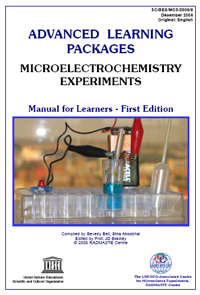Microelectrochemistry Experiments

Published in 2006, the Learning and Teaching Manuals on Microelectrochemisty add to materials already available in the Teaching and Learning Packages on Chemistry, part of the Global Microscience Project.
Microchemistry Kits and Workbooks are designed by the UNESCO-Associated Centre for Microscience Experiments, located at the University of the Witwatersrand, Johannesburg as part of the RADMASTE Centre of the Faculty of Science, in cooperation with International Union for Pure and Applied Chemistry (IUPAC) and UNESCO. They are developed and promoted by UNESCO via its strong relationships with different non-governmental and intergovernmental organizations throughout the World.
These Kits and Workbooks have been brought to the attention of educators in more than 85 countries. This led to wide implementation in many countries and motivation to extend work into other areas of science. Thus in addition to the original chapters on Chemistry first published in 2002, the Microlectrochemistry Experiments are part of new materials added in 2006.
Related links:
:: Microelectrochemistry Workbooks : for Students [.pdf]
:: Microelectrochemistry Workbooks : Teacher Guides [.pdf]
:: International Foundation for Science Education (IFSE)
Contacts:
:: Ms J. Hasler, Programme Specialist, Division of Basic and Engineering Sciences
:: Ms M. Liouliou, Project Coordinator, Division of Basic and Engineering Sciences
:: Ms B. Bell, Executive Director, International Foundation for Science Education (IFSE)
Author(s): RADMASTE UNESCO Associated Centre
- Publication Date: 16-10-2008

